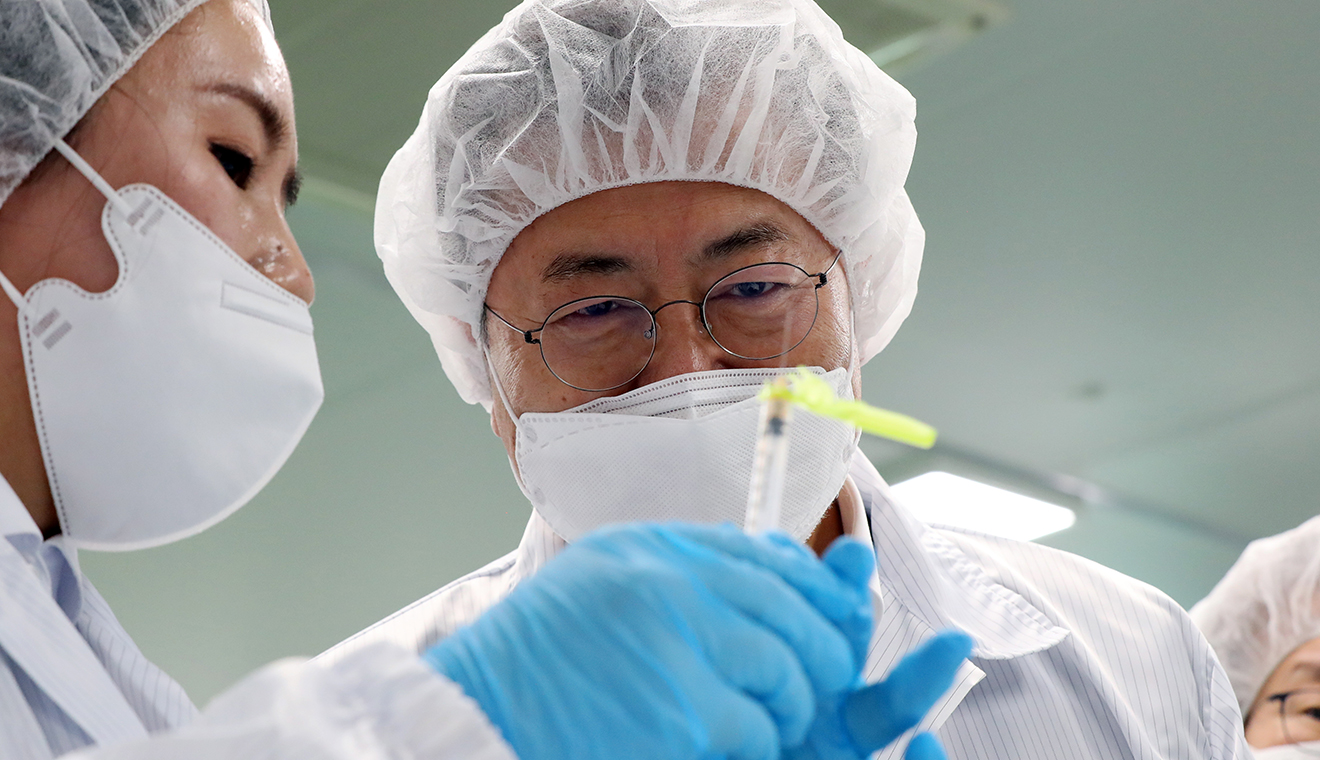March 2021

March 2021
With the arrival of the first COVID-19 vaccine doses, the government starts its vaccination campaign on February 26, giving the shots first to patients and workers at the most vulnerable medical care facilities in the country.
Written by
Sohn Ji-ae
Photo courtesy of
YonhapNews
 Nurses are trained to administer a COVID-19 shot.
Nurses are trained to administer a COVID-19 shot.
COVID-19 infections remain high across South Korea as the daily caseload continues to remain in three digits. Worse, the spread of more contagious variants keeps posing challenges to the country’s antivirus efforts.
Amid the challenges, the Korean government has gone all out to speed up the rollout of arriving vaccines across the country.
As the first batch of COVID-19 vaccines touched down in the nation, the government came up with a plan to roll out vaccines to begin the mammoth task of inoculating its people as swiftly and effectively as possible. Its target is to get 70 percent of its population vaccinated by September this year, creating so-called "herd-immunity" by November.
The Korea Disease Control and Prevention Agency (KDCA) on Feb. 15 announced the vaccination plan that would kick off the nation’s first COVID-19 shots with AstraZeneca for the high-risk group on Feb. 26. Under the plan, nursing hospital workers and patients — an estimated 272,000 people — are among the first to get vaccinated.
Starting from March 8, a total of 354,000 front-line healthcare workers at general hospitals with a high number of COVID-19 infected patients will be second in line for the AstraZeneca vaccination. From March 22, 78,000 more people working on the front lines battling the virus, including paramedics, quarantine officers and epidemiological investigators, will be the next recipients of the shot.
The AstraZeneca’s two-dose regime for seniors aged over 65, however, will be put on hold, due to growing concerns over the lack of data on how safe and effective the vaccine is in the elderly, the KDCA said. The health authorities confirmed delaying inoculation for the age group until more data become available. Those aged over 65 are likely to get a shot during the second quarter of 2021 upon arrival of new batches of vaccines.
Some have raised concerns that the decision could possibly hamper the government’s overall vaccination plan which was initially to give the jabs to as many as 1.27 million including the elderly within the first quarter. But the health officials were confident that, “The change will not have a big impact on the end goal of achieving herd immunity in November.”
Meanwhile, the government worked to speed up vaccination by setting up approx. 250 inoculation centers across the country. Current candidate sites include indoor state-run public facilities, such as stadiums and performance venues, as well as medical centers.
 President Moon Jae-in on Feb. 18 examines a low dead space syringe at the PoongLim Pharmatech production factory.
President Moon Jae-in on Feb. 18 examines a low dead space syringe at the PoongLim Pharmatech production factory.
As more vaccines, including U.S. pharmaceutical company Pfizer’s, are expected to arrive in the nation, the government plans to administer vaccines to more front-liners in the next months to come.
Good news is, the government recently finalized deals with U.S. drugmakers on additional new vaccines for 23 million people, meaning the country can inoculate up to 79 million — which is greater than the nation’s population. The government on Feb. 16 announced that it had signed deals to have new 20 million vaccines from Novavax and, also, three million Pfizer vaccines to be received by the second quarter.
The government also secured Pfizer’s agreement to speed up the shipment of vaccines for around 500,000 people by the end of March, which was initially scheduled to arrive in the third quarter.
Homegrown vaccines are on the way, too. SK Bioscience, a vaccine business subsidiary of the conglomerate SK Group, struck an expanded collaboration and license agreement with Novavax. According to Novavax’ press release on Feb. 16, “SK Bioscience has obtained a license to manufacture and commercialize Novavax’ COVID-19 vaccine for sale to the Korean government. The company will add significant production capacity under this new agreement.”
It is highly anticipated that the Novavax-SK Bioscience deal will play a big role in speeding up the development and scaleup of homegrown vaccines through the transfer of technology.
In addition, homegrown syringes will help improve the efficiency of vaccines, health officials said, “by 20% by minimizing drug residues left in needles.” PoongLim Pharmatech’s low dead space (LDS) syringes are designed to minimize wasted vaccine doses by reducing space between the needle and the plunger when fully pushed in. Experts say that the LDS syringes can squeeze up to six doses while ordinary ones can only five ones.
As the government spares no effort to secure vaccines for all its people and scale up the vaccine supply with the development of homegrown vaccines, the nation’s antivirus efforts will hopefully pay off in the end.